Spring arrives slowly but surely in Connecticut. Daffodils and tulips begin to poke up from the thawing ground, and crocuses begin to appear alongside melting snow. Dogwoods and forsythia burst into bloom, adding welcome hues to the landscape. And all across the state, homeowners rush to prepare their lawns and gardens for the warmer weather.
Connecticut has a robust number of farmers raising flowers, shrubs, and other plants that can help you breathe new life into your landscape, create enticing displays within your home, and add beauty to your special occasions. Spring is a busy time for these producers, who make up the largest share of Connecticut’s agriculture.
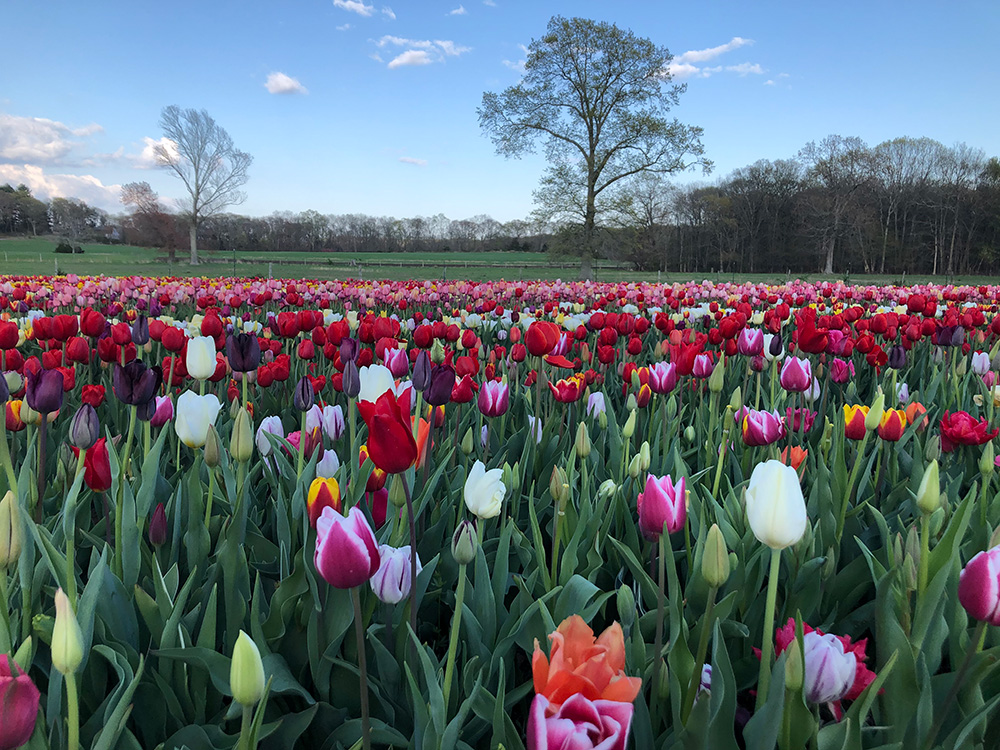
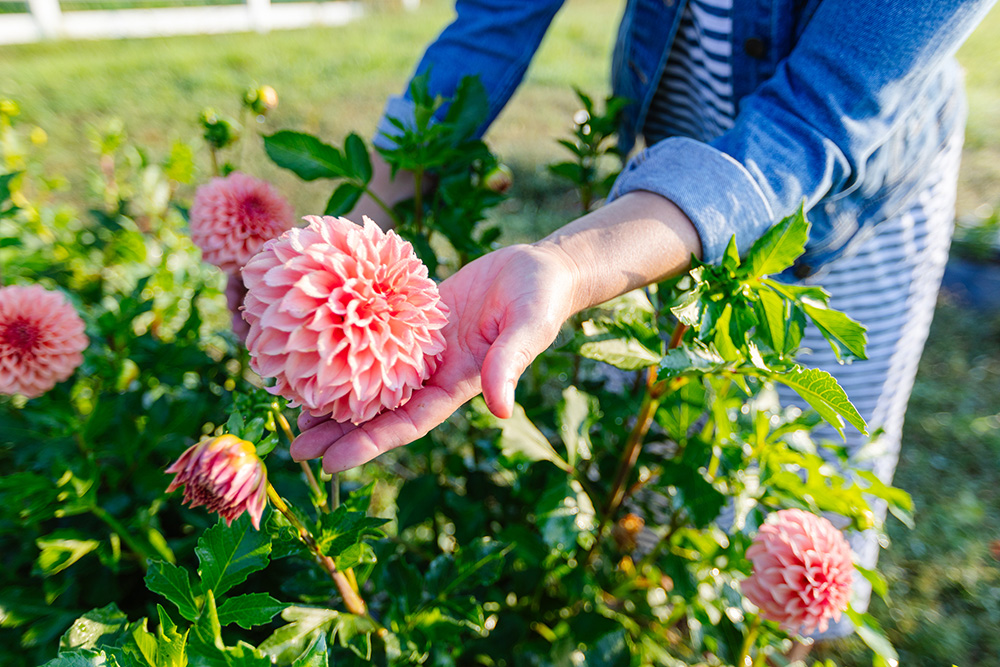
In this blog, we explore how Connecticut’s greenhouses, nurseries, farms, and garden centers are excellent places to visit during the spring. Whether you’re looking to improve your home or simply want a memorable experience, you’ll find something that’s right for you.
Greenhouses, nurseries and garden centers
Throughout the winter, Connecticut’s greenhouse and nursery producers have been busy sowing seeds, potting plants, and preparing to assist customers in the new growing season. By visiting a CT Grown greenhouse or nursery, you’ll receive:
- Expert guidance: Whether you’re trying to liven up a shady spot or need advice on growing a specific plant, greenhouse and nursery producers can offer expert advice and care plans tailored to your own property.
- Educational opportunities: The spring season often brings workshops and other educational opportunities at greenhouses and nurseries. Attendees can learn about seed starting, container gardening, composting, and much more.
- Great deals: To encourage people to pursue the big plans they have for their garden, nurseries and landscapes may offer discounts or open up loyalty programs at the beginning of the spring season. Take advantage of these to enjoy savings throughout the year.
- New inspirations: A visit to a garden or nursery can inspire a new vision for your home. Discover new plant options and features that can transform your rooms or landscaping.
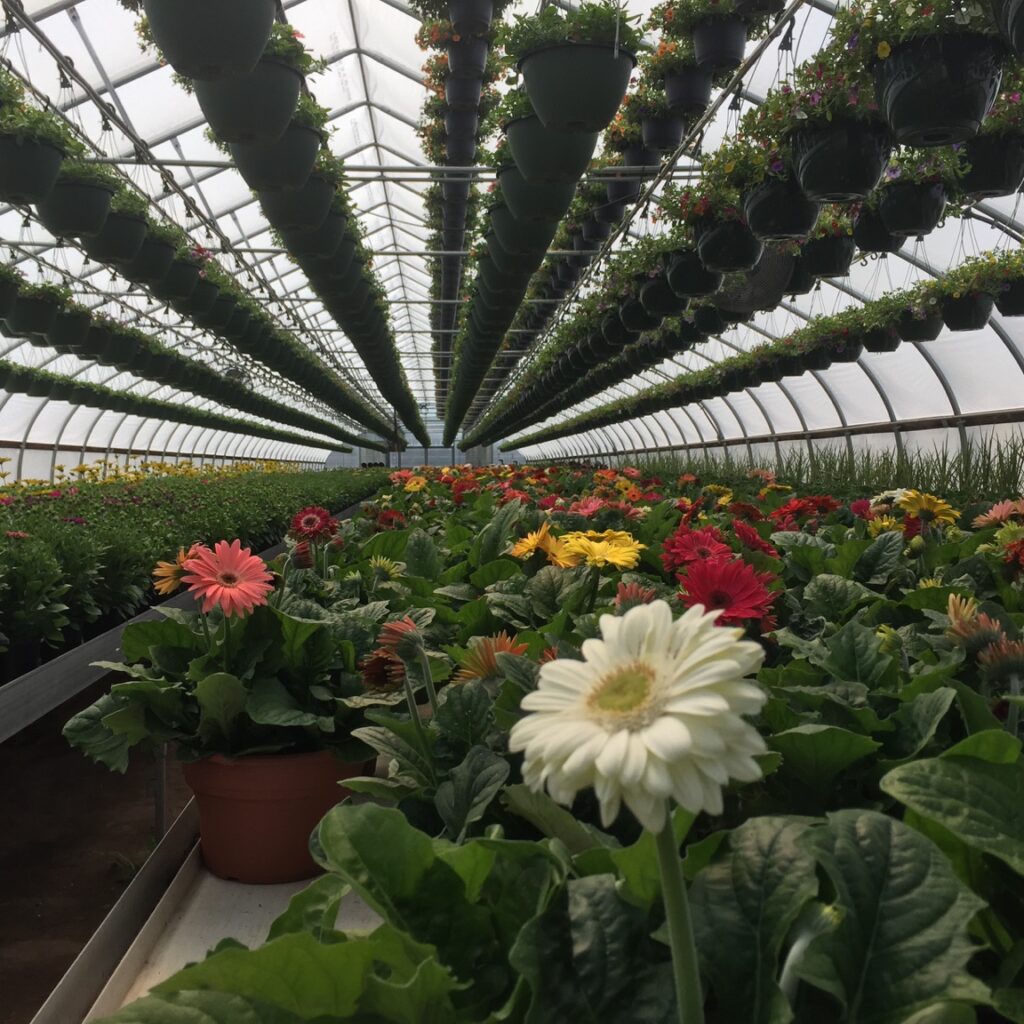
There’s no shortage of products available at greenhouses and nurseries to get a jump on the year’s gardening plans, including:
- Annual flowers: Although annuals only last a single season, they add a welcome pop of color to your garden and are easy to care for. Some of the annuals available in spring include Easter lilies, impatiens, marigolds, pansies, and petunias.
- Perennial flowers: Perennials return year after year, making them an easy option for long-term garden planning. Some spring perennial choices include coneflowers, daylilies, and hostas.
- Shrubs: A useful choice for boundaries or privacy barriers, shrubs can also create beautiful landscaping and support pollinators when you choose flowering varieties like butterfly bushes, hydrangeas, and viburnums.
- Fruiting trees: Add a small orchard alongside your vegetable garden using varieties like apple and cherry trees.
- Vines: Transform vertical surfaces into part of your garden using vining plants like clematis and honeysuckle.
- Vegetable starts and seedlings: Plants that have been sown indoors — including eggplants, herbs, peppers, and tomatoes — let you get a jump on the year’s harvest.
Walk-through flower experiences
Some farms in Connecticut give visitors an up-close look at the returning floral landscape by offering walk-through experiences. Visitors can stroll through the fields and marvel at the spectacle of thousands of flowers in bloom together.
In a relaxing, meditative experience, visitors are surrounded by the visual beauty and delightful scents of a sea of flowers. These scenes are also a popular photographic backdrop for everything from family portraits to engagement shots.
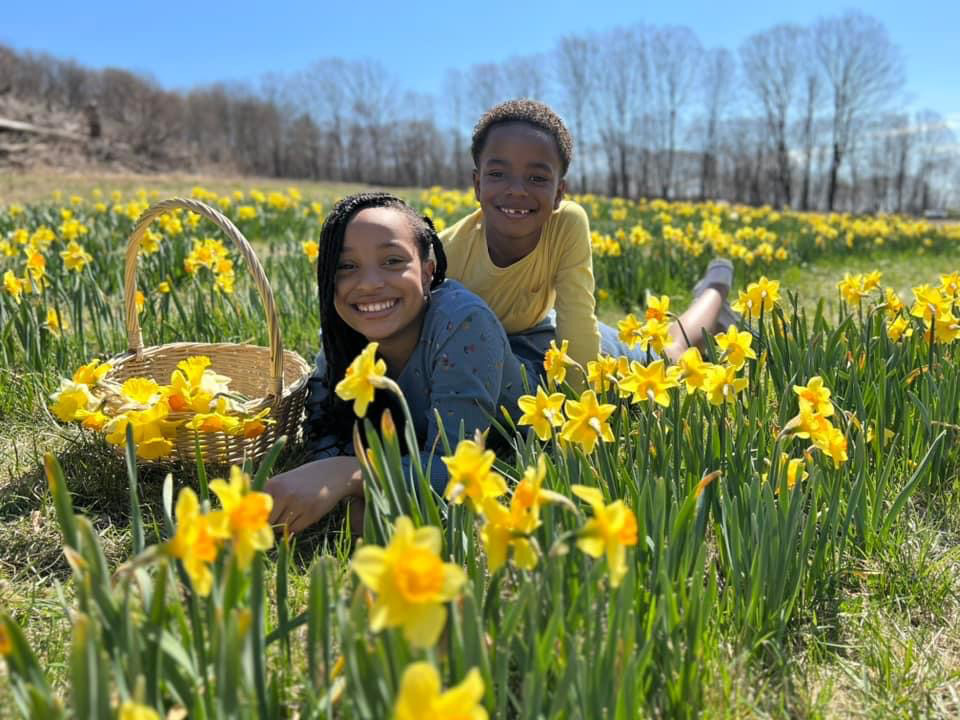
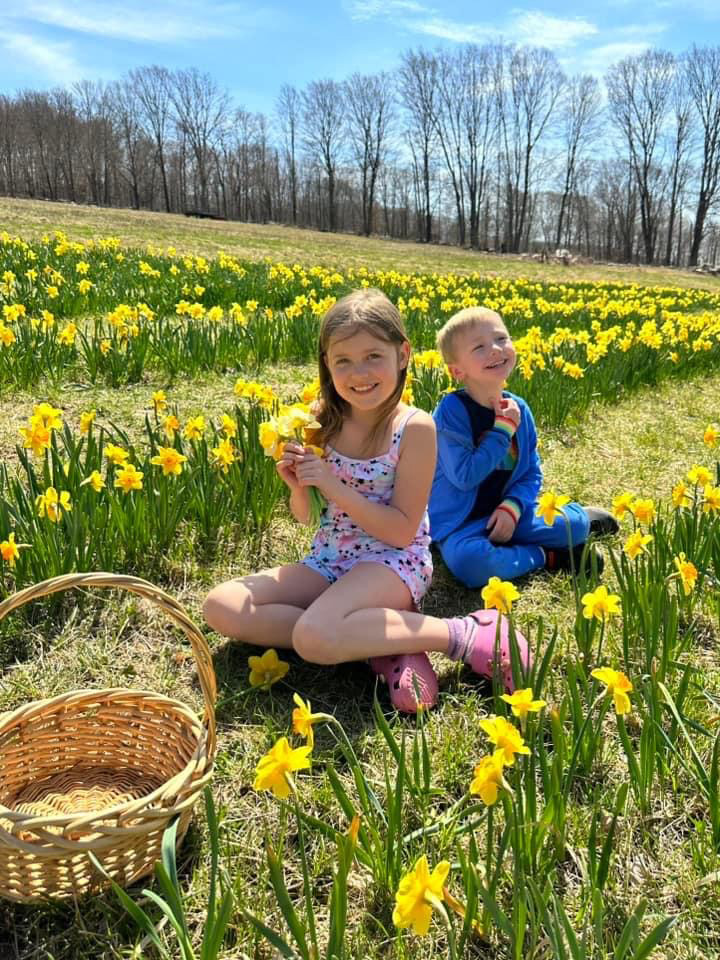

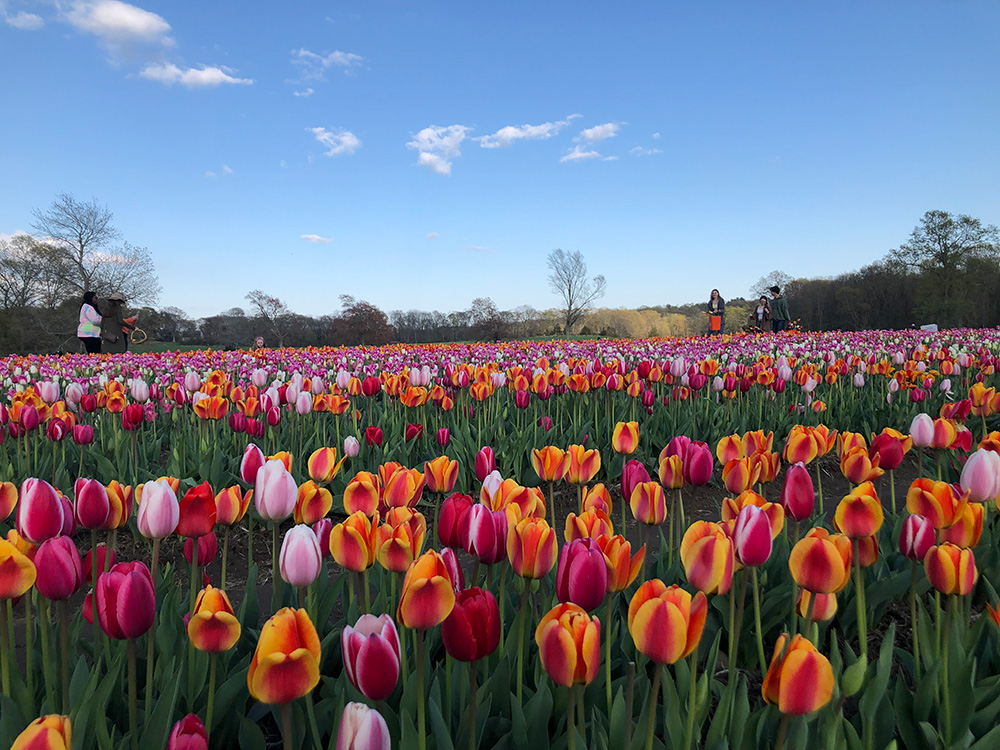
Walk-through flower experiences are often paired with pick-your-own options that let you take home a beautiful bouquet. Some options in Connecticut include:
- Halfinger Farms (Higganum): Every year, “Dancing Daffodils” at this farm lets visitors visit a field of these brilliant yellow flowers and pick their own selection. Halfinger Farms hosts several special events alongside the daffodil season, while also raising additional flowers such as peonies, violas, and mums.
- Lavender Pond Farm (Killingworth): Denise Salafia established this farm as a tribute to her mother, who died of breast cancer. Today, it invites visitors to walk through the fields as thousands of lavender plants come into bloom.
- Wicked Tulips (Preston): One of three locations growing a total of more than 1.5 million tulips, Wicked Tulips gives visitors the one-of-a-kind experience of walking through a vast field of these flowers during their brief but awe-inspiring time in bloom.
- Willow View Farm (West Suffield): Along with thousands of ornate dahlias, this farm lets visitors pick a selection of varieties that include daffodils, peonies, and tulips.
Cut flower CSAs
Community Supported Agriculture (CSA) programs go well beyond the traditional shares of fruits and vegetables, and Connecticut’s thriving floriculture businesses mean that there are plentiful options to find cut flower CSAs. Farms may offer these options either on their own or as an optional add-on to another CSA.
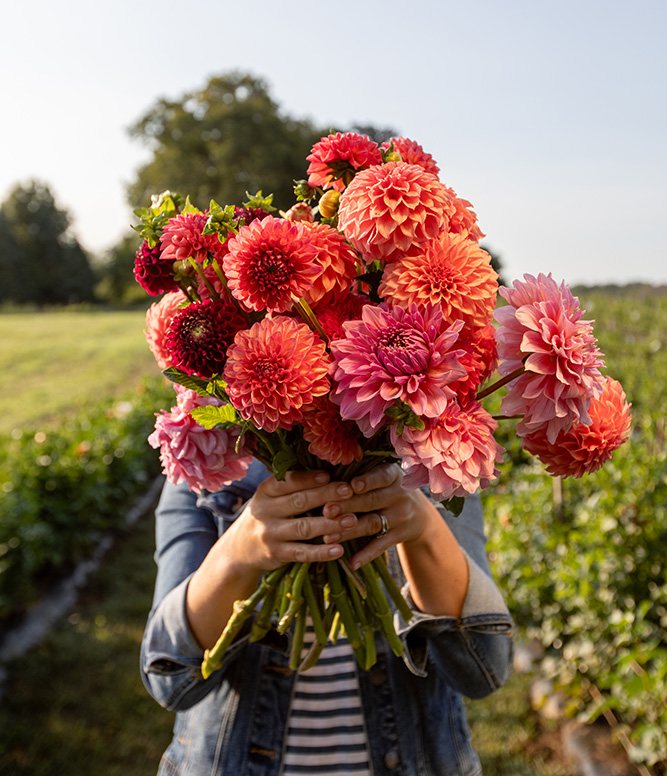
Spring flower CSAs are an excellent choice for people who can’t wait to get fresh flowers back into their home after a long winter. These feature seasonal flowers such as alliums, anemones, canterbury bells, daffodils, hyacinths, narcissus, ranunculus, and tulips. Farms often grow specialty varieties that aren’t usually found in stores, allowing each farm to create bouquets with a distinctive look.
Cut flower CSAs continue into summer and autumn, with each new share changing based on what’s in season. Some farms may also offer these CSAs into the winter, featuring greenhouse-grown flowers.
To find a cut flower CSA near you, visit the CT Grown map.
The spring season brings a welcome return of color to the Connecticut landscape, with warming temperatures signaling the start of a new growing season. We’re taking off our winter coats, starting preparations for our home gardens, and marking our calendars to get a bouquet for Mother’s Day.
It all makes for a busy time for CT Grown greenhouses, nurseries, and flower and sod producers. Across Connecticut this spring, you’ll find cut flowers, potted plants, bedding plants, hanging baskets, and more to make your home and garden beautiful this year.
This guide will share some of the amazing flowers grown locally, and give you tips on where to find them.
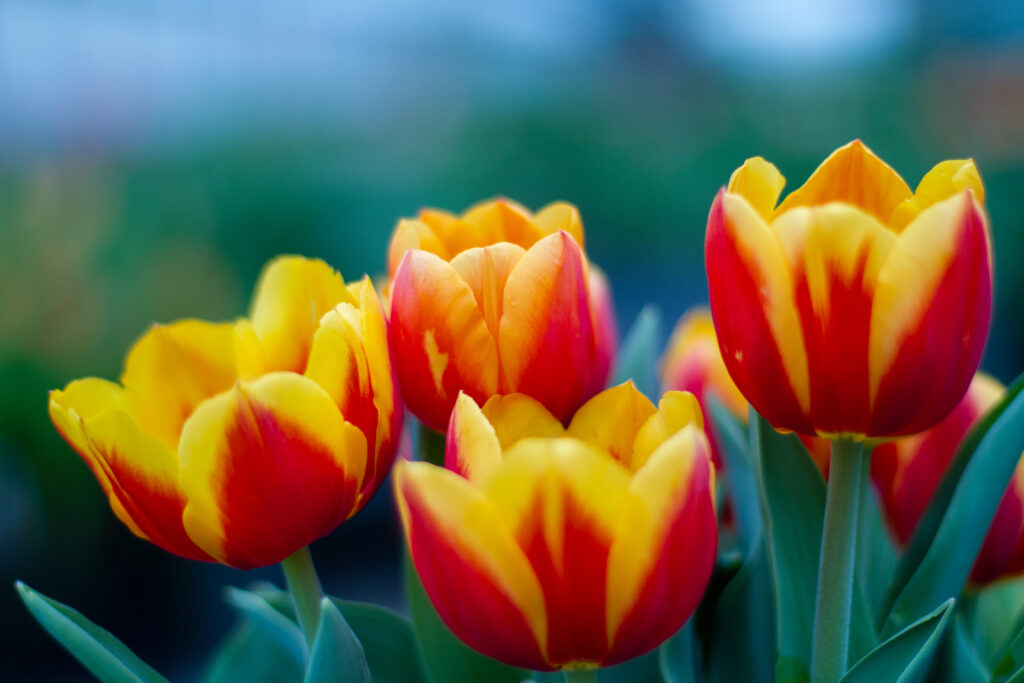
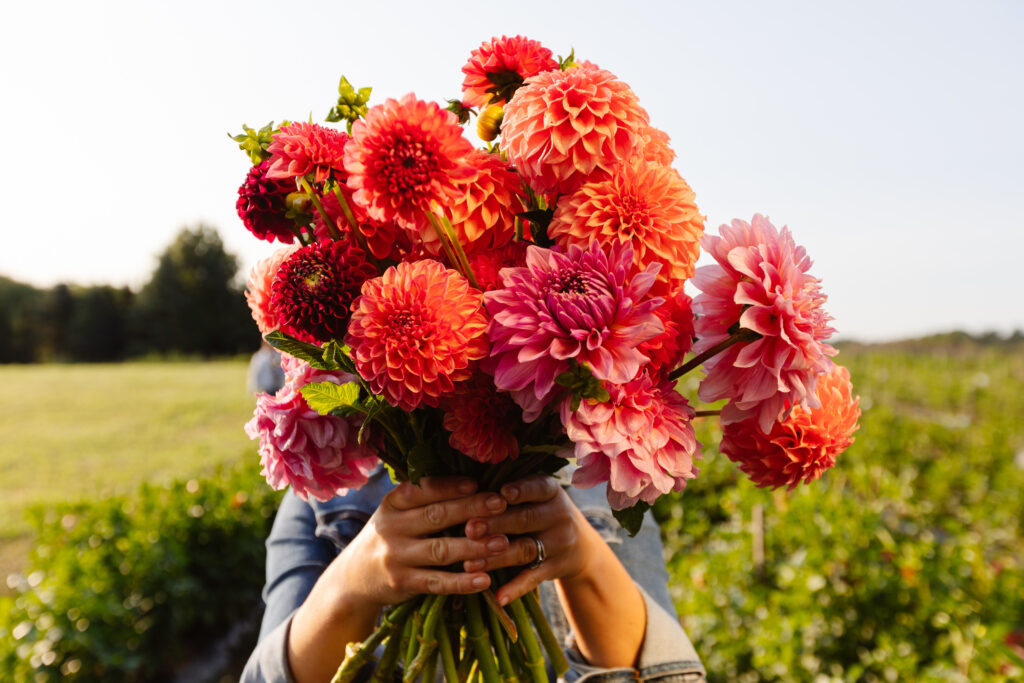
Perennial flowers
Perennials are a favorite among gardeners because they return year after year and don’t need to be replanted. An underground structure, such as a bulb, allows them to stay dormant over the winter and regrow in the spring.
Popular options for spring-flowering perennials in Connecticut include:
- Alliums
- Asters
- Coneflowers
- Cranesbill geraniums
- Daffodils
- Foxglove
- Hyacinth
- Irises
- Lavender
- Peonies
- Phlox
- Tulips
Once the risk of a final spring frost has passed, you can also plant bulbs for perennial flowers that will bloom in the summer. Some options include begonias, dahlias, and lilies.
Annual flowers
Annual flowers grow for a single season and need to be replanted each year. They work well alongside perennials, which usually have a shorter flowering period, and allow gardeners to experiment with new and interesting flowers each year. Some flowers are technically perennials, but are grown as annuals due to their shorter lifespan.
Some popular options for annuals that can be planted in the spring include:
- Calendulas
- Larkspur
- Marigolds
- Petunias
- Snapdragons
- Sunflowers
- Sweet alyssum
- Zinnias
Flowering shrubs
Flowering shrubs are large, woody perennial plants that are well-suited for landscaping purposes. They can be used not only to make your home more attractive, but also as a natural way to define property lines and create a privacy screen.
Some popular options for flowering shrubs in Connecticut include:
- Azaleas
- Forsythia
- Hydrangeas
- Lilacs
- Mountain laurel
- Rhododendrons
Flower farms
Some farms in Connecticut specialize in growing cut flowers, and spring allows them to start hosting pick-your-own occasions and other events.
One example is the “Dancing Daffodils” field at Halfinger Farms in Higganum, where visitors can collect the bright yellow flowers for 70 cents apiece. At Wicked Tulips in Preston, a ticketed pick-your-own event lets you stroll through the fields and collect 10 tulips; the farm also hosts Yoga in the Tulips events during the spring.
Farms may also grow flowers alongside their other crops, and these blooms have become an increasingly popular option for CSAs. These programs let you regularly pick up bouquets of freshly cut flowers, bringing a bright and aromatic addition to your home for several weeks. Traditional CSAs may also offer an add-on option for flowers.
Plant and seedling sales in Connecticut
While early spring is typically too cold to begin growing plants outdoors in Connecticut, you can get a head start by planting seeds indoors and transplanting them once it gets warmer. You can also find seedling and plant sales across the state that have already started this process for you.
Plant and seedling sales offer annual and perennial flowers as well as seedlings for herbs and vegetables. Some give a special focus to native plants — species that occur naturally in the region and thus are beneficial to the local ecosystem.
Sales are sometimes hosted by farms to help generate revenue early in the season. They are also a popular fundraiser for organizations like garden clubs and arboretums.
Some upcoming plant and seedling sales in Connecticut include:
- Connecticut River Coastal Conservation District 2023 Native Plant and Plug Sale, Chester, April 28-29, 2023
- Connecticut Horticultural Society Plant Sale & Auction, Berlin, May 5, 2023
- Hill and Dale Garden Club Plant Sale, Glastonbury, May 6, 2023
- Friends of Hammonasset Plant Sale, Madison, begins May 11, 2023
- Bartlett Arboretum & Gardens Plant Sale, Stamford, May 13, 2023
- West Hartford Garden Club Spring Plant Sale, West Hartford, May 20, 2023
Connecticut flower festivals
The Connecticut Flower and Garden Show, which occurs annually in late February, attracts upwards of 40,000 people. Flower festivals, hosted by garden clubs and other organizations, continue into the spring. These are some of the upcoming events that herald the return of spring:
- Cherry Blossom Festival, New Haven, April 16, 2023
- Daffodil Day, Middletown, April 23, 2023
- Daffodil Days, Essex, through April 23, 2023
- Fine Art and Flowers, Hartford, April 28-30, 2023
- Meriden Daffodil Festival, Meriden, April 29-30, 2023
- May Market, Farmington, May 5, 2023
- Colorblends House and Spring Garden: Bridgeport, through May 7, 2023
- Dogwood Festival, Fairfield, May 13-14, 2023
Nurseries and greenhouses

Greenhouses, nurseries, and flower and sod producers represent the largest farm sector in Connecticut, accounting for more than half of the state’s agricultural production as measured by gross sales. They also have a considerable add-on impact to the state’s economy, supporting additional businesses such as florists and landscaping services.
While the terms are often used interchangeably, greenhouses and nurseries serve separate purposes. Greenhouses shield plants from the elements under glass or other protection, allowing for year-round cultivation. Nurseries don’t necessarily use this protection, and primarily serve to grow plants to a mature size. However, greenhouses can still be considered nurseries if they are used for this purpose.
Connecticut has almost 600 greenhouse growers, primarily specializing in cut flowers, flowering plants, and garden plants. Greenhouses shelter nearly 13 million square feet of cultivation space, and Connecticut ranks 15th in the nation for total greenhouse area.
Greenhouse operations are often paired with outdoor acreage to grow more flowers and plants during the warmer seasons. Connecticut has a mix of both small businesses and larger wholesale nurseries, which distribute plants throughout the world.
Gardeners may have the option to visit a nursery or greenhouse directly to browse the available selection. However, some businesses only deliver their products to landscapers, wholesalers, or garden centers.
Garden centers
Garden centers receive a selection of flowers and other plants from producers. They are also set up as one-stop shops for all your gardening needs. Some garden centers operate independently, while others are an on-site feature of greenhouses and nurseries.
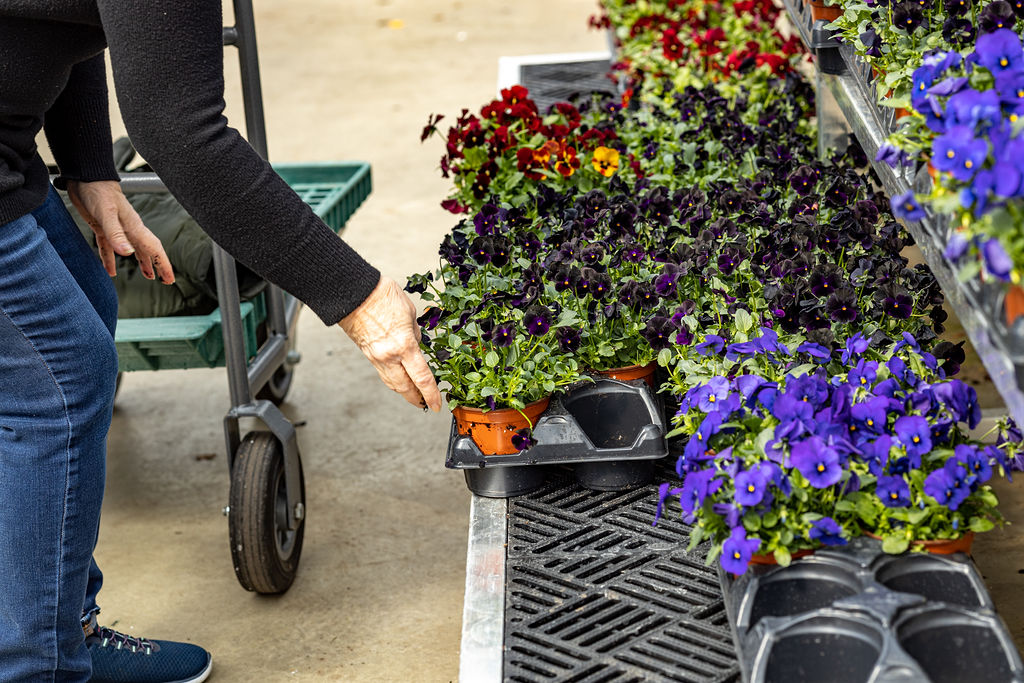
In addition to flowers and plants, garden centers provide items like soil mixes, gardening tools, seeds, fertilizers, and garden decor. They can also offer services like landscape design and installation, as well as clubs and events to provide gardening advice.
As an added bonus, Connecticut garden centers may partner with local farms to sell CT Grown items like fresh fruits and vegetables, meats, honey, and eggs.
CT Grown flowers at local retailers
Connecticut farms, greenhouses, and nurseries often supply both local businesses and major retailers with freshly cut flowers and other CT Grown plants. You can find the CT Grown label on flowers sold by florists, supermarkets, and chain stores like Lowe’s and Home Depot.
Additional resources for Connecticut flowers
The following organizations can provide additional information and resources on flowers in Connecticut:
- Connecticut Flower Collective: This collaborative market in Meriden connects several Connecticut flower growers with businesses ranging from florists to event planners. The market focuses on wholesale transactions on Wednesdays, but is open to the public on Thursdays, Fridays, and Saturdays
- Connecticut Horticultural Society: Since 1887, this organization has worked to encourage and improve the practice of gardening. The organization regularly hosts events including speakers, workshops, and trips.
- Connecticut Nursery and Landscape Association: An organization dedicated to promoting and enhancing Connecticut’s green industry, the Connecticut Nursery and Landscape Association also provides tips for home gardeners and referrals for professional services.
- Federated Garden Clubs of Connecticut: Founded in 1929, this organization aims to encourage high standards, civic beauty, and the conservation of natural resources in Connecticut’s garden clubs. It oversees numerous programs including events, projects, and educational workshops.
- University of Connecticut Extension: Part of UConn’s College of Agriculture, Health and Natural Resources, the Extension runs numerous educational programs including a master gardener’s course.
February 23, 2023 @ 10:00 AM – 7:00 PM
Spring in February arrives annually at the Connecticut Convention Center! Explore exhibits overflowing with fresh flowers, plants, herbs, bulbs, seeds, gardening books, garden equipments & much more. View beautifully landscaped gardens full of greenery and stop by the Federated Garden Clubs of Connecticut design & horticulture competition. We also offer over 80 hours of seminars and demonstrations across a variety of topics.
Related Events
“I don’t think I need a box of vegetables every week.”
It’s a leading concern we hear from people who aren’t sure if they’ll benefit from joining a CSA (Community Supported Agriculture) program. They worry that their CSA will have more vegetables than they can use each week (or that it won’t have the kind of produce they’ll use), resulting in wilted vegetables and lost money.
Rest assured, CSAs aren’t just limited to boxes of vegetables; there are options available for a wide variety of products, including meat, flowers, and seafood. Just like traditional CSAs, they allow CT residents to enjoy fresh food, get to know their local farmers and producers, and enjoy member perks while supporting Connecticut’s agricultural economy.
CT Grown farmers have also improved the flexibility of their CSAs in key, innovative ways. Read on to find out about the different types of CSAs that can fit your lifestyle.
Meat CSAs
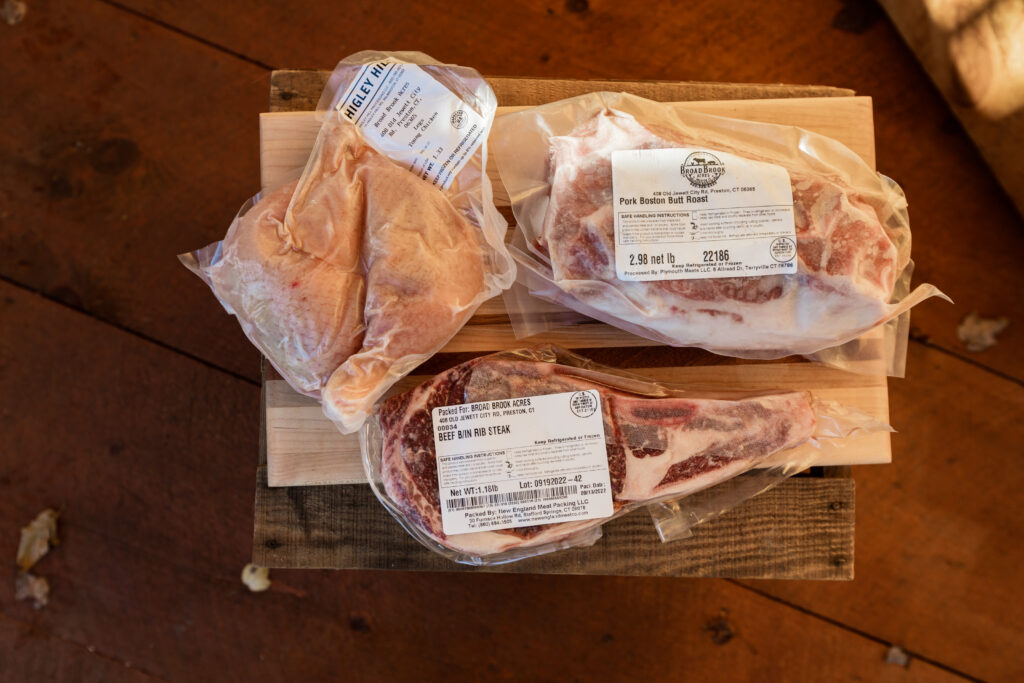
Across Connecticut, livestock farmers are raising thousands of animals from the traditional beef, poultry, and pork to a bit more exotic such as bison and emu.
While traditional CSAs provide different types of vegetables, meat CSAs offer a variety of meat cuts such as chops, sausages, ribs, roasts and ground meat. The program may provide a few pounds of meat every week, or monthly pickups with a larger selection.
CT Grown livestock producers are open to sharing the sustainable practices they use to raise their animals. Some practices include grass-fed diets, pasture-raised practices which are said to yield a higher nutritional value and better taste.
Meat CSAs can work particularly well for those who are worried that their CSA shares will be inconsistent or that they will let food go to waste. Since meat CSAs are based on weight, you’ll be guaranteed a set amount of food with each share. Any meat you don’t use can be stored in the freezer until you need it.
Community Supported Fisheries (CSF)
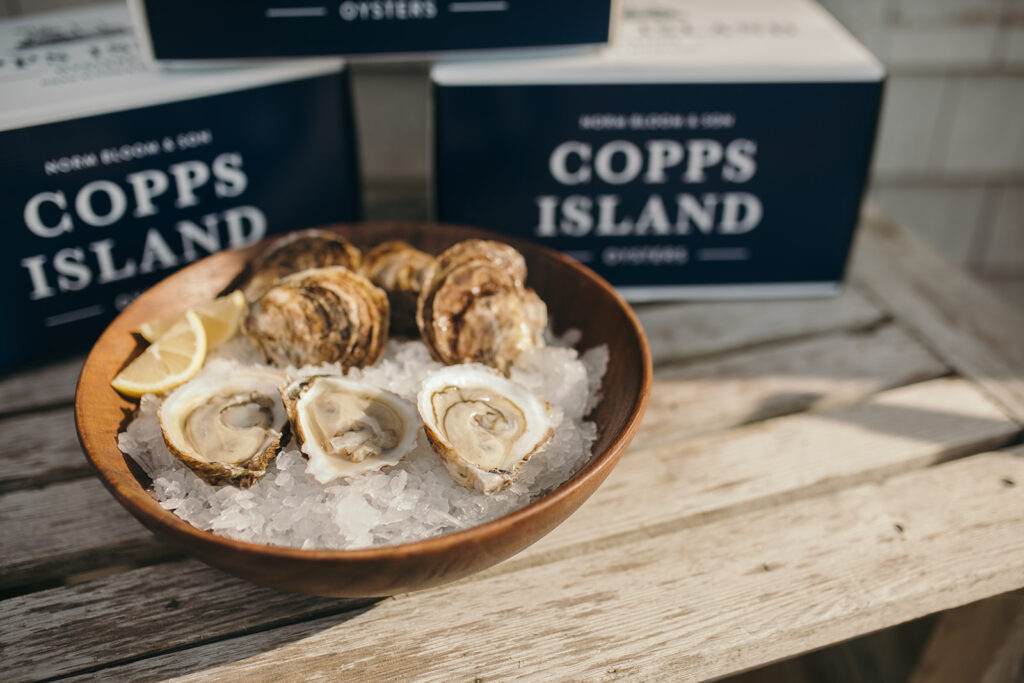
Similar to meat CSAs, Community Supported Fisheries (CSF) programs let you enjoy fresh seafood soon after it has landed on Connecticut’s shores. In exchange for your upfront payment, you’ll get regular shares of aquaculture products like fish, shellfish, and kelp.
CSF programs work to make these products available to the consumer as quickly as possible. Seafood is purchased from local fishermen, then processed and made available for pickup.
While traditional CSAs help farmers cover the costs of each new growing season, CSFs help CT Grown aquaculture producers to pay for expenses like boat repairs and the purchase of new gear.
Flowers and seeds
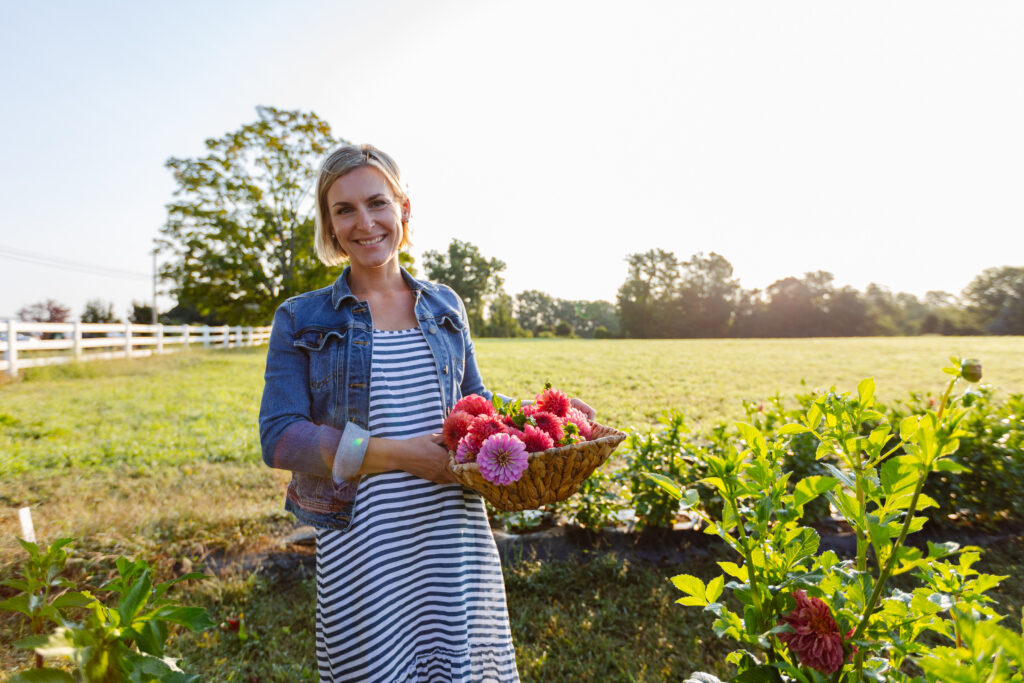
Countless families have picked up locally produced flowers to add beauty and fragrance to their home. If you want to keep these displays as a more consistent part of your home decor, you might consider a flower CSA.
Flower CSAs offer bouquets of flowers with an ever-changing variety based on what’s in season. You may have the option of picking your own flowers, and some CSAs even provide seed packets so you can grow additional lovely blooms in your own garden.
This type of CSA gives you the freshest flowers possible, since you’ll be getting them directly from the farm. It can also be a good option for those looking to try out a CSA for the first time, as flower CSAs tend to be less expensive and cover a shorter span of time.
Subscriptions and customizable shares
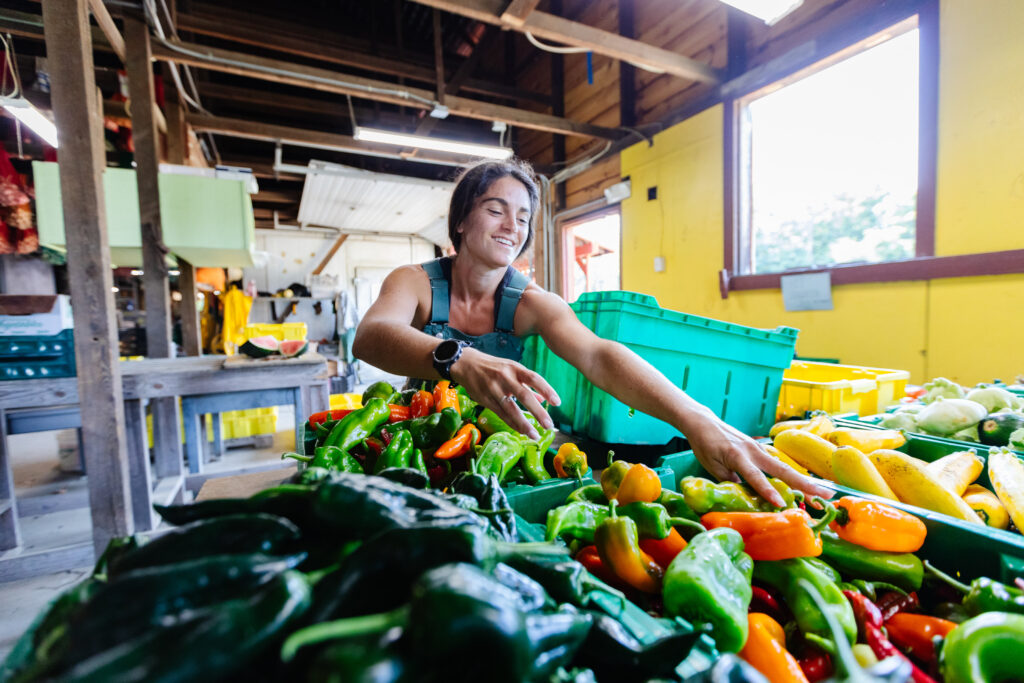
Farms can offer programs that are similar to CSAs but provide more opportunities for flexibility and customization. Vegetable subscription boxes let you choose how frequently you receive your produce and how many weeks your subscription will run. CSAs also may have a “market style” setup, allowing you to pick and choose what you’d like to take home.
Programs may involve collaborations between multiple producers in order to provide a range of goods. Some Connecticut dairy farms have started subscription delivery services that not only bring milk to your doorstep, but also goods like eggs, granola, and breads.
If you frequently use a certain commodity, you may find a farm offering a CSA exclusively for this item. These specialty CSAs include items like bread, cheese, eggs, honey, maple syrup, milk, and mushrooms.
CSAs sometimes invite you to pick your own produce as part of the experience. Instead of getting a preselected portion of fruits or vegetables, you might be invited to head into the fields to take your pick of items like berries, flowers, herbs, hot peppers, snap peas, or tomatoes.
To learn more about how CSAs work, visit our previous blog. To find a CSA near you, visit this map.
